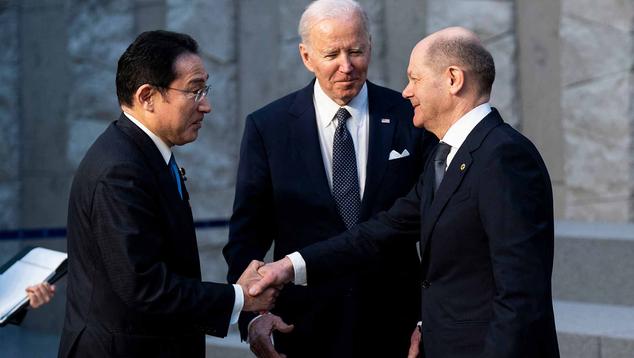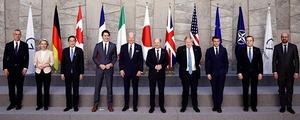Story Highlights
- Median approval of Germany's leadership is at 43% in Asia
- U.S. leadership not far behind at 41%
WASHINGTON, D.C. -- Ahead of President Joe Biden's special summit with Southeast Asian leaders next month, the image of U.S. leadership is in a much stronger position than it has been in years, not only in Southeast Asia but across most of the continent.
Gallup surveys show median approval of U.S. leadership across Asia shot from 31% in 2020 to 41% in 2021, and the U.S. now essentially ties Germany for the most-positively viewed leadership in the region.
Unlike approval of the U.S., Germany's 2021 approval rating was mostly unchanged from previous years, while Russia (33%) and China (27%) were also on a similar footing to where they have ranked in the past. China's approval continued to drift slightly lower in 2021.
The median 41% of adults in the region who view U.S. leadership positively is a substantial increase over any reading during Donald Trump's presidency but is still slightly below the trend-high 45% recorded in 2013. Notably, the approval rating for the U.S. is based largely on data collected during or after the withdrawal of U.S. forces from Afghanistan in August 2021 and before Russia's invasion of Ukraine in early 2022.
Countries Driving the Increase in Approval for U.S.
Ratings of U.S. leadership showed substantial improvement in 13 Asian countries and territories in 2021, including South Korea, where ratings increased 29 percentage points; Australia and New Zealand, which each saw ratings jump 22 points; and Taiwan, Province of China, where ratings rose 17 points.
Highest and Lowest Approval of German and U.S. Leadership
At the country level, Germany's leadership was viewed most positively in Australia at 70%, followed closely by New Zealand at 69%, both record highs for the respective countries. This increase may be at least partly related to the German government's efforts to play a greater role in the region and participate in collective security arrangements favored by the Australian and New Zealand governments.
The publics in Pakistan and Cambodia were least likely to view German leadership positively, with 23% in each approving of the country's leadership. Approval of German leadership in Pakistan, while low compared with other countries in Asia, is on the high end of the trend for the country.
The highest level of approval for U.S. leadership was the 71% recorded in the Philippines, a traditional U.S. ally in the region. Additionally, the U.S. was viewed particularly positively by several other traditional allies, including South Korea (59%), Australia (51%), Israel (50%) and Japan (50%).
In contrast, the lowest level of approval for U.S. leadership was in Iran, where the 7% of Iranians who approved was little changed from levels since 2018. In Afghanistan, where U.S. forces were in the process of drawing down and withdrawing from military operations during the survey period, residents had already soured on U.S. leadership. The 14% of adults who approved was unchanged from 2019. Pakistanis were also particularly negative about U.S. leadership, with less than a quarter (23%) approving, though this is on the higher end of the trend for Pakistan.
Bottom Line
Many view Asia as likely to be the most significant global region for the 21st century, and the politics of the area have been increasingly defined by great power competition. This competition makes soft power or the approval of countries' leaderships particularly important. The soft-power dynamic also has economic implications as Asian countries join trade groups and open or close their markets to the powers vying for position in the region.
The world's attention is focused primarily on the war in Ukraine. The lessons from that conflict about the future of alliances and the global order are likely being closely watched throughout Asia. As it currently stands, the region is positively disposed toward German and U.S. leadership, but a substantial shift or upset in that conflict could contribute to upending those views.
To stay up to date with the latest Gallup News insights and updates, follow us on Twitter.
For complete methodology and specific survey dates, please review Gallup's Country Data Set details.
Learn more about how the Gallup World Poll works.




